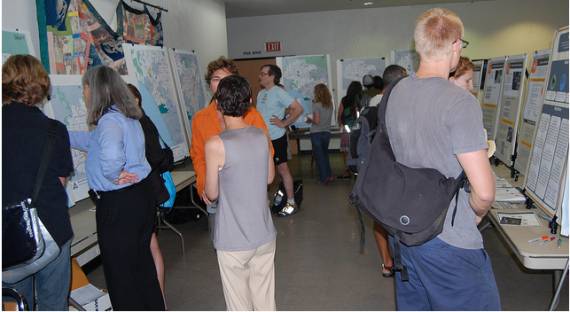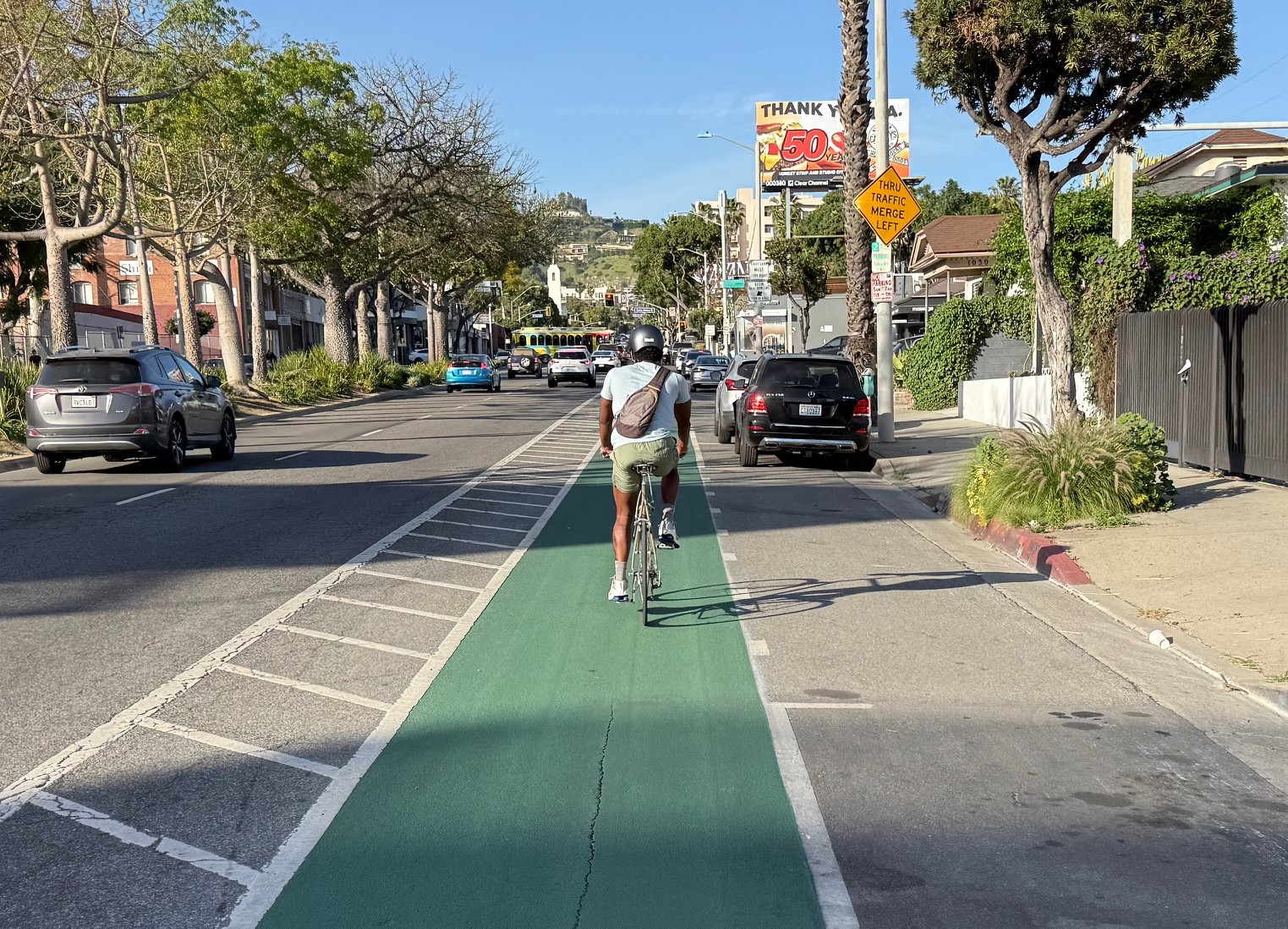
(Note: There is a Bike Plan meeting tonight in South L.A. and Saturday in Van Nuys. Check out the Streetsblog calendar for more information. A list of Streetsblog's complete coverage of the Bike Plan from the launch of this website can be found here.- DN)
In February of 2008, the LADOT, City Planning, and consultants Alta Planning held a series of four meetings on what was then called the Bike Master Plan to solicit feedback on what should be studied as the city embarked on a planning process that promised to lead to safer cycling throughout the city. Eighty people showed up to a hearing at the Felicia Manhood Constituent Service Center, and the mood at the hearing was contentious. Nobody could claim that there was a lack of passion in the room.
Twenty months later, the two city agencies and their consultants were back at the Service Center with an updated plan that had already been widely panned by the bicycle community. This time, there was no power point presentation and no chance to give public testimony on the plan. Nevertheless, nearly 50 people attended the meeting; most with bad things to say about the current draft of the plan.
Yesterday, a mere eleven months after the last round of meetings, the final round of public meetings kicked off last weekend in Hollywood. Last night we were back in auditorium at Felicia Manhood. An hour into the meeting, which consisted of the poster boards pictured above and a public comment period; not even two dozen people had signed in. Even Alta Planning was nowhere to be seen.
Last night was proving the rule, not the exception, to a turnout slump. City Planning staffer Jordann Turner confirmed that turnout was significantly lower than two dozen at the Hollywood Meeting held on Saturday although more of those that did attend took time to comment, and Streetsblog commenter Dennis Hindman noted that only four people took part in a "webinar" earlier that day. What can be the cause of this low turnout? Are cyclists so happy with the current draft of the plan that they didn't see a need to turn out, or are they just exhausted after nearly three years of public meetings and delays? The latter explanation seems unlikely, as gathered around the poster board people continued to wonder what exactly a "bicycle friendly street" is really going to look like and prognosticate that most of this plan won't be completed anyway.
The highlight of the meeting wasn't even the presentation given by city staff, but an opening comment by City Council Transportation Committee Chair Bill Rosendahl. Rosendahl's comments can be seen after the jump.
The rest of the public comment was short on speakers. Six people testified, and one of the speakers was a Cheviot Hills homeowner who wanted to complain about the Expo Line Bike Path. Another was Bike Advisory Committee Chair Glenn Bailey, who is appearing at all of the meetings to promote the BAC and deliver, over the course of six minutes, pieces of a large testimony.
There were some other notable comments. Hindman noted that nearly 50% of the funds in the five year expenditure plan, covering from now until 2015, will be spent in the San Fernando Valley instead of the Downtown, Mid-City and Westside where there are already more people cycling. Madeline Brozen, a UCLA planning student, noted that an unused rail along the San Fernando Road would make an excellent Rails to Trails program and took the time to mock a "bike route" sign on Ohio Avenue that points to the sidewalk.
Another interesting point was brought up by Eric Weinstein, a member of the Los Angeles County Bicycle Coalition and volunteer at the Bikerowave, who questioned why there was no language referencing "Complete Streets" in the plan. With a state "Complete Streets" mandate going into law later this year, it seems odd that a Bike Plan, even one that contends that all streets are for bicycle use, would leave out language that any road project should study whether there should be a bicycle component.
The "Final" plan, including responses to public comment, will go to the City's Planning Commission on November 7th and will also be heard by the Transportation Commission, two City Council committees and the Full Council before final approval.
Update: Tuner writes in with the following:
In regards to the Complete Streets Act, the draft Bicycle Plan contains numerous references to the Complete Streets Acts. Chapter 2 (pages 33 and 34) describe how the implementation of the Bicycle Plan would fulfill the goals of the Complete Streets Acts. Additionally, Chapter 4 (Policies and Programs) contain policies and programs design to implement the Complete Streets Act. As an example Policies 1.14 and 1.1.6 contain programs that encourage the inclusion of bicycle facilities as Bicycle Friendly Streets and the inclusion of bicycle lanes as part of the reevaluation of the City's street standard designations.
. Complete streets (chapter 2 page 33, 34 and numerous programs that reference goals of complete streets (chapter 4) ie Street designation review to include bicycle lanes (1.1.4 and 1.1.6).






